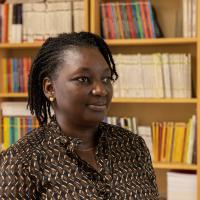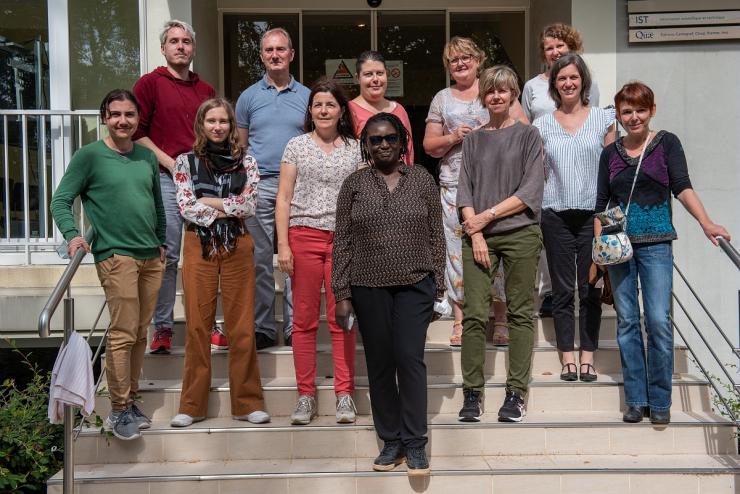
Reading time 10 min
Esther Dzalé, opening science for a better world
Published on 29 November 2021
Making research data accessible and reusable allows science to advance faster, further and equitably for everyone
When she was little, Esther dreamed of saving the world. Today, she is proud to be part of an organisation whose work is assuredly making the world a better place. For Esther, making research data accessible and reusable allows science to advance faster, further and equitably for everyone. “Working in open science means making sure that scientific knowledge is available and accessible beyond linguistic boundaries, between organizations and across disciplines. It’s very meaningful; that appeals to me.” Esther Dzalé is collected yet determined, curious and attentive, passionate about her work and fully aligned to her values.
Citizen of the world
Esther was born into humble circumstances in Burkina Faso, and received a scholarship to continue her studies at the African Computer Science Institute (IAI) in Libreville, Gabon. While studying there, she met her Cameroonian husband. Although computer science suits her well, it is not a field she had set out to work in. “Logic is a part of computer science, but you have to draw on your creativity too, because you start from nothing when designing a project. It’s also a way to help people, because you create something that fulfils a need they have.” After graduating from IAI, she went to France to do an internship at the French National Centre for Scientific Research (CNRS), where she discovered the lively world of scientific research. She enjoyed the feeling of non-stop intellectual stimulation, and considered doing a PhD, but her need for practical and tangible outcomes led her to INRIA, where she helped to set up the BioGenOuest bioinformation system. In 2005, Esther moved to France permanently after successfully sitting the competitive examination to become an engineer at INRA. She remains a citizen of the world, however. “Thanks to my work, I collaborate with people from everywhere, even as far away as New Zealand.”
Long term and long distance
I like to finish what I start, I want to see the results
In 2014, Esther challenged herself to do the 54km night walk between Paris and Mantes-la-Jolie. It’s easy to draw parallels between that long-distance walk and the determination and drive that she always brings to her work. “At the start, you feel enthusiastic, exhilarated; it’s new and everyone is excited. Once you get going though, you soon run into obstacles. Some people give up, but I like to finish what I start. When I set a project, I want to see the results. The last few kilometres are really mind over matter. Your legs are tired, your feet hurt. But once you cross the finish line, you feel a real sense of accomplishment.” When it comes to long-term projects, Esther has been involved in quite a few at INRAE. The first was to support the creation of ProdINRA, the Institute’s open archive for all its publications, including journal articles, scientific reports and papers. “When I arrived at INRA, it was the start of the open access movement. With the creation of ProdINRA, we were blazing new trails.” Esther then developed Noria, an application for bibliometric analysis that can assess the profile and standing of scientific journals and help researchers develop a publication strategy. In 2011, she began to take an active interest in the semantic web, and carried out a number of pioneering projects in the field. The aim was to build pathways to share knowledge among different disciplines and fields of study and thereby promote the reuse of knowledge. To do so, knowledge is described in a contextual way, explicitly as possible, using a common (although not wholly standardised) vocabulary. This allows knowledge to be cross-connected and to increase its usefulness.
Sharing data and moving science forward
Research data management is a core aspect of Esther’s career, and she’s particularly passionate about sharing research data. More than a simple interest in the topic, for Esther, it’s a real conviction. “Making research data and publications openly accessible can help to resolve crises, and help to resolve them more quickly. The rapid scientific progress on COVID was possible because of data sharing.” Starting in 2013, Esther began examining questions about managing and sharing data, such as how, when and if data should be shared, under what conditions, and how to ensure that others could make best use of the data. This process of reflexion led to the development of Data Partage, a website to exchange best practices, and Data INRAE. The aim was twofold: to create a space, outside of thematic reference data warehouses, where all of INRAE’s scientific data could be compiled and shared, and to develop a catalogue of INRAE data. Through Data INRAE, Esther and her teams have developed a tool that makes data more accessible, interoperable and reusable. She is also active at the international level, participating in the Research Data Alliance, an international organisation with over 7,100 members, researchers and science data professionals in 137 countries, to develop collective data sharing systems. Esther is a leader in the field, and is changing the game. Operationally, she has spearheaded the introduction of digital object identifiers (DOI) for datasets within INRAE, which allows the data sets to be cited in the same way as other scientific publications such as journal articles. Strategically, her work has informed INRAE’s data management policies. Recognised as an expert in her field, Esther and her teams have been entrusted with the management of an ambitious national project to develop a data repository for all universities and research institutes in France. The project is set to launch in spring 2022.
Sharing is caring
In 2017, Esther became director of the Delegation for Scientific and Technical Information (DIST) at INRA. When INRA And IRSTEA merged in 2020, she became the head of the digital technology for science team at INRAE, overseeing 23 full-time staff. Esther is passionate about her work, and draws inspiration from her interactions with other people. “Having a single point of view on a subject is problematic. The more involved you are in strategic thinking, the more important it becomes to consider different points of view.” And considering different points of view is easy for Esther, as she is always interacting with her science and technical data colleagues, with scientists and with other open-science stakeholders. “It’s an ongoing opportunity for professional — and personal — development.”
“INRAE is more than just a job; it’s a family. It offers you the opportunity to pursue training or to change your role. I feel as though I’ve had so many different careers all while staying in one place!”
WHAT's NEXT?
Esther continues to be involved in numerous activities, including the EOSC-Pillar Project, where she is managing a case study to test the incorporation of INRAE’s data and infrastructure resources into the European cloud for open science. Esther and her teams are also working with the Directorate for Information Systems (DSI) to develop a new on-demand service at INRAE. The goal is to offer shared infrastructure resources (networks, computing power, storage capacity) in order to increase the flexibility, effectiveness and strategic value of research teams.
Esther is also supporting the creation of a network of data specialists within INRAE to develop a community of practice for data. “The aim is to build capacity in this area and to develop shared tools and spaces that support researchers onsite.”

THE INRAE AWARD, AN ACCOMPLISHMENT AND AN HONOUR
“Receiving an award is very gratifying. It’s also a recognition from INRAE of all my work and of all the work that goes on behind the scenes every day with my colleagues. Without my team, I would never be able to carry out all these projects.” Without Esther’s strategic vision, ambition and perseverance, however, the projects would surely not have been the same.
Mini CV
48 years old, maried, with two children
- Career
2020: head of the digital technology for science team of the Directorate for Open Science (DipSO) at INRAE
2017–2019: director of the Delegation for Scientific and Technical Information (DIST)
2016–2017: executive certificate in big data for business, CentraleSupélec, Paris
2012–2017: project manager, project design assistance, coordinator of research data skills resource centre, DIST
2005–2011: research and development engineer for applications, DIST, INRA
2002–2005: senior database engineer for BioGenOuest information system, IRISA, INRIA - Education
2002: university degree with specialisation in research, information and communication systems, business intelligence focus, ISIMA, Clermont-Ferrand
2000: computer science degree, Institut Africain d’Informatique (IAI – African Computer Science Institute), Libreville
1996: programming and analysis degree, Institut Africain d’Informatique (IAI - African Computer Science Institute), Libreville - Hobby: likes to walk in her free time
